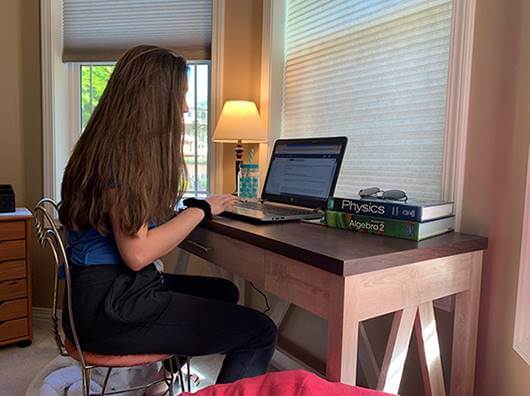
This article provided by Oregon Transformation Newsletter,
Online schools could be a godsend for students and parents alike, but Oregon has shut down that opportunity
By Nicole F. Miller, CEO of Word’s Out PR
Each family is experiencing the coronavirus pandemic in their own way. In our family of four, my husband holds the steady job, I am a self-employed small business owner, and we have two school-aged kids. This whole experience of school being cancelled (and later, distance learning for all), businesses closed, staying at home, has upended the seamless rhythm our family had. I can only imagine the ripple effect in households all over the world.
In our home, up until Gov. Brown’s Executive Order No. 20-05 on March 12, 2020, I felt I had somewhat achieved “balance” in the elusive work-life balance situation of an entrepreneur with school-aged children. Nearly 15 years into running a public relations agency based in Stayton, Oregon, I had this great juggling act in an efficient rhythm.
With a dedicated office at a co-working office space in downtown Stayton, and a home office for the times I needed to work at home, I had my focus areas carved out. With a fifth grader and ninth grader occupied in school during the day, I had at least six uninterrupted hours per day, five days a week, to work. The rest of the time, I was able to work, just while putting the kids’ activities and schedules first. I like to think this is the life of a typical self-employed parent, working on-the-go much of the time.
When Gov. Brown’s Executive Order on March 17 extended the school closure until April 28, we knew we had to do something for our kids. The feelings of despair were closing in, and I couldn’t imagine how I could achieve that balance of working while keeping the kids engaged and holistically well. We discussed the idea of enrolling our eldest in one of Oregon’s online public schools, Oregon Connections Academy. It was an easy decision — turns out we got in just in time before the state passed another executive order disallowing school transfers.

Nicole Miller’s ninth grade daughter studies at the online school,
Oregon Connections Academy, during the pandemic
We chose an online school for a number of reasons that held true at that time:
- Because local schools were doing “supplemental learning” (as opposed to full-time school schedules)
- To continue the momentum of learning
- To lift her spirits
- For a sense of normalcy and calm
- To seize the opportunity to try something new
Our freshman eagerly launched immediately into online school. It’s just like learning a new physical school — but in place of navigating hallways, the student is navigating message boards and lesson plans. Instead of sitting in a desk in the classroom, our daughter was sitting at a desk in our spare room, or curled up on the couch with the dog. Instead of raising her hand to ask a question, she can either email, call or text the teacher. Or if it’s a “live lesson,” she can chime in during the video class.
We were figuring out our new normal. About two weeks in, it was starting to feel good. Our daughter was motivated to get up in the morning, she was on a roll finishing lessons and taking online tests. She was really flourishing. I, now working from home full time, was feeling reassured that she was in qualified hands and on track academically.
That security we felt was temporary, as Oregon started doling out decisions that seem entirely politically motivated, not serving the kids’ best interests.
On April 11, the Oregon Department of Education (ODE) made the decision to not fund schools that gained in enrollment retroactively to December 31, 2019. This disproportionately hurt the online schools that were primed to best serve our students during this time.
On April 15, ODE released new guidance that required all public schools — including online schools — to adhere to a pass/no pass policy. In our world, that meant that the hard work our daughter had done to earn good grades was being pulled out from underneath her, much like our seniors are experiencing in the traditional brick and mortar schools. But why is this necessary for online schools, which, by nature of their educational delivery system, meet the “stay home, stay safe” requirements?
What I’ve learned is that online public school education can be a real blessing. Oregon Connections Academy provides the curriculum, the delivery platform, the caring staff and the academic experience we sought during this pandemic. Online schools have a valuable place in education. For some it may be a permanent solution, while for others it may serve a temporary need.
From a business perspective, it seems backwards that, at a time when our students and families could most use the incredible resource of online schools, the state is limiting access to that solution by stopping enrollment and defunding students who transfer into these schools, even taking away online students’ ability to earn grades. Why break down these schools that are working fine in this pandemic? The coronavirus can’t spread in online schools.
All parents must work hard to keep their children emotionally, mentally and physically well during this crisis. Keep searching for ways to regain family balance, and don’t let this situation get you down. My parents always said that we feel better when we take action.
I’ll be emailing [email protected] with my perspective.
I encourage my fellow Oregonians to do this as well.
This article provided by Oregon Transformation Newsletter,
Disclaimer: Articles featured on Oregon Report are the creation, responsibility and opinion of the authoring individual or organization which is featured at the top of every article.

